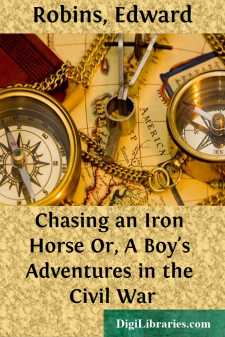Categories
- Antiques & Collectibles 13
- Architecture 36
- Art 48
- Bibles 22
- Biography & Autobiography 813
- Body, Mind & Spirit 142
- Business & Economics 28
- Children's Books 17
- Children's Fiction 14
- Computers 4
- Cooking 94
- Crafts & Hobbies 4
- Drama 346
- Education 46
- Family & Relationships 57
- Fiction 11829
- Games 19
- Gardening 17
- Health & Fitness 34
- History 1377
- House & Home 1
- Humor 147
- Juvenile Fiction 1873
- Juvenile Nonfiction 202
- Language Arts & Disciplines 88
- Law 16
- Literary Collections 686
- Literary Criticism 179
- Mathematics 13
- Medical 41
- Music 40
- Nature 179
- Non-Classifiable 1768
- Performing Arts 7
- Periodicals 1453
- Philosophy 64
- Photography 2
- Poetry 896
- Political Science 203
- Psychology 42
- Reference 154
- Religion 513
- Science 126
- Self-Help 84
- Social Science 81
- Sports & Recreation 34
- Study Aids 3
- Technology & Engineering 59
- Transportation 23
- Travel 463
- True Crime 29
Chasing an Iron Horse Or, A Boy's Adventures in the Civil War
by: Edward Robins
Categories:
Description:
Excerpt
CHAPTER I
HAZARDOUS PLANS
The lightning flashes, the mutterings of thunder, like the low growls of some angry animal, and the shrieking of the wind through swaying branches, gave a weird, uncanny effect to a scene which was being enacted, on a certain April night of the year 1862, in a secluded piece of woodland a mile or more east of the village of Shelbyville, Tennessee. In the centre of a small clearing hemmed in by trees stood a tall, full-bearded man of distinguished bearing. Around him were grouped twenty sturdy fellows who listened intently, despite the stir of the elements, to something that he was saying in a low, serious tone of voice. None of them, strangely enough, wore a uniform, although they were all loyal Union soldiers belonging to the division of troops commanded by General O. M. Mitchell, then encamped on the banks of Duck River, only a couple of miles away. For the country was now engaged in the life-and-death struggle of the Civil War, when Northerner fought against Southerner—sometimes brother against brother—and no one could predict whether the result would be a divided or a reunited nation.
“My friends,” the speaker was solemnly saying, as a new flash from the darkened heavens lit up the landscape for a second, and showed how resolute were the lines of his face; “my friends, if you go into this scheme with me, you are taking your lives into your hands. It’s only fair that I should impress this upon you, and give any and all of you a chance to drop out.”
There was a quick, sharp clap of thunder, which was not loud enough, however, to drown the earnest protest of every listener. “We’re not cowards, Andrews!” “We’ll stick to you through thick and thin!” “Nobody’s going to draw back!” These were among the fervent answers which greeted the leader addressed as Andrews. The latter was evidently pleased, though by no means surprised. He was dealing with brave men, and he knew his audience.
“All the better, boys,” he went on, with a complacent ring in his soft but penetrating voice. “You see, this is the situation. The Confederates are concentrating at Corinth, Mississippi, and Generals Grant and Buell are advancing by different routes against them. Now, our own General Mitchell finds himself in a position to press into East Tennessee as far as possible, and he hopes soon to seize Chattanooga, after he has taken Huntsville, Alabama. But to do this he must cut off Chattanooga from all railroad communication to the south and east, and therefore all aid. In other words, we men are to enter the enemy’s country in disguise, capture a train on the Georgia State railroad, steam off with it, and burn the bridges leading in the direction of Chattanooga, on the northern end of the road. It is one of the most daring ideas ever conceived, and its execution will be full of difficulties. If we fail we shall be hanged as spies! If we succeed, there will be promotion and glory for all of us, and our names will go down into history.”
There was a murmur of encouragement from the men, as one said: “We must succeed, if only to save our necks.” The next moment the barking of a dog could be heard above the whistling of the wind....



